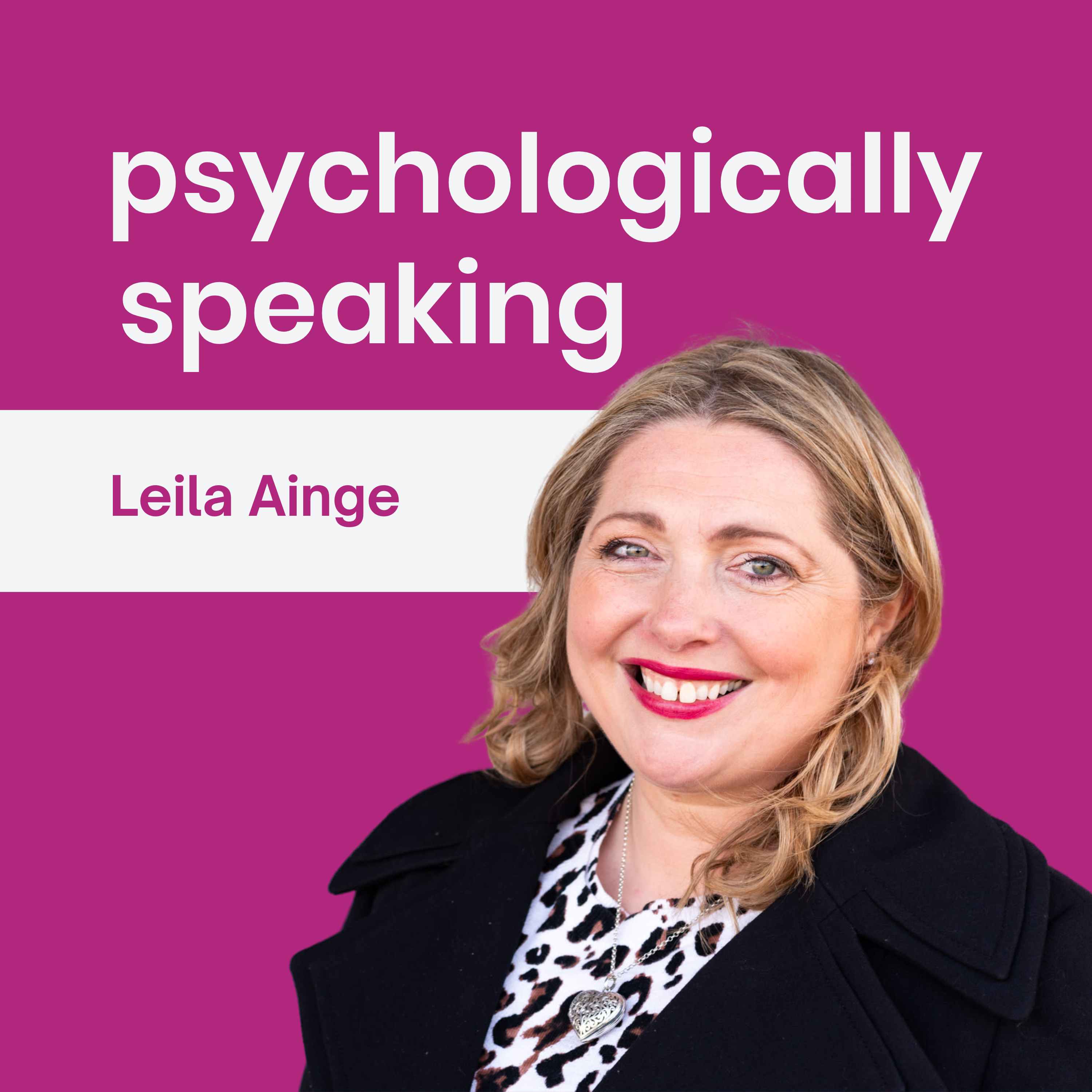Gratitude, My Unsung Hero.
In this episode, Leila explores the concept of gratitude and how it can help us to balance the uncertainty that is often associated with the Imposter Phenomenon. Listen as Leila tells the story of incredible scientists who made a groundbreaking discovery about ageing and approaching difficult situations, and how this relates to our experiences of Imposter Phenomenon.
Links
Read the book about the Telomere effect https://www.elissaepel.com/telomere-effect
Elizabeth Blackburn TedTalk https://www.youtube.com/watch?v=2wseM6wWd74
Connect with Leila online at www.leilaainge.co.uk and subscribe to her newsletter for psychological insights direct to your inbox.
Transcript
leilaainge 00.00
I was talking to someone this week about the challenge of staying positive when we face uncertainty we can't and shouldn't be positive all of the time. In fact, defensive pessimism has a particularly useful role to play in preparing us for uncertainty. Thinking forward to potential setbacks is a nifty way to problem solve thinking through scenarios and ruminating on a problem is good for a while as long as we avoid negative rumination and worrying. We are told to be optimistic because it's good for us. Many studies show the health benefits of a positive outlook in life but it is harder to be positive when uncertainty outweighs the things we think we can control. This is just one of the ways in which we experience imposter phenomenon in episode 2 we explored the impact that imagined audiences with all of their uncertainty has on our behaviour. So today. We'll take a look at one of life's unsung heroes the grounding experience of gratitude. And how it can help us to take the uncertainty that is synonymous with imposter feelings and bring balance to our worldview.
01:25.50
leilaainge
But I want to take a detour and tell you a story about incredible scientists caregiving pond life and stress Elizabeth Blackburn is a molecular biologist. She won a nobel prize with her colleagues for researching pond organisms and they are cells that debt. Elizabeth Blackburn is a molecular biologist. She won a nobel prize with her colleagues for researching pond organisms specifically pond organisms that have cells that don't die or get old. Unlocking the formula for aging is important work and they discovered that an enzyme called telomerase is responsible for maintaining the length of a telomerre now telomeres are the caps at the end of our Dna threads Elizabeth Blackburn describes these. Being like the aglets on the end of our shoelaces those little plastic things they stop the ends from fraying and telomeres do the same job for our chromosomes. So imagine a chromosome and you'll see I've seen this represented as an x image in a biology book.
02:43.47
leilaainge
You can also think of it as 2 threads that cross over each other and these threads are packed full of Dna all I want you to remember at this point is that the length of your telomeres those caps at the end of the chromosome relate to aging. And those pond organism cells had plenty of an enzyme that maintained the length of those telomeres. This is what stopped those cells aging and dying now. This was a phenomenal discovery. But what happened next changed the way we think about stress. Elizabeth Met Elissa Epel a health psychologist and she was researching stress in mothers of children with a chronic condition. So as a group these mothers were under what we would call prolonged psychological stress now stress is normal. Now stress is normal. Our bodies are uniquely equipped to deal with stressful situations when we encounter stress a cascade of events kicks into action very simply releasing adrenaline and noradrenaline to prepare us for fight or flight. And then 20 or so seconds later a signal goes up to our hypothalamus in the brain to trigger hormones which flood the body with cortisol about 20 minutes after the thing that stressed us and if everything goes to plan the cortisol travels back up to the hypothalabus.
04:17.75
To stop further production of cortisol and we go back to normal when we are chronically stressed though our production of cortisol remains heightened and we start to see elevated stress levels that don't return to baseline. And this is what we might have expected to see from a group of people who were subject to prolonged psychological stress but the work that Elizabeth and Alyssa were doing was to look at the biological impact on their cells as well as looking at cortisol levels. Elizabeth and Alyssa looked at the length of the telomeres of these caregiving mothers. But they also asked them about their perceived stress using a questionnaire the result shows that the longer the mother had been caregiving the shorter the telomeres. Suggesting there was a reduction in the maintenance of cells which leads to increased cell aging and using their questionnaire data the more these women perceive their situation as being stressful the lower they found the enzyme levels for maintaining the telomeres Elizabeth and Alyssa have. Biological evidence at a cellular level that the more chronic stress you are under the shorter your telomeres. Essentially these women would age in a quicker way including disease but they also observed stress resilience in the study.
05:45.40
leilaainge
Women who rated themselves as lower in perceived stress had longer telomeres for these women they experienced or approached the day-to-day caregiving as a challenge rather than a threat this lifetime of work by Elizabeth and ilya provides an understanding of the. Biological response to perceived stress it demonstrates that stress can accelerate the aging process. However, it's not the size or the intensity of the stress that is the main factor so you might. Be thinking lila that was a lot of biology but what has this got to do with impostor and gratitude. Well gratitude is known to reduce feelings of stress and anxiety in the long term by reducing cortisol levels and it's also thought that people who express gratitude. May have more grey matter but that's for another time during my research I found that women who experienced imposter feelings found online spaces to be risky and exposing their response to this threat though wasn't a complete retreat from being an entrepreneur. Or even an exit from online spaces instead they found risk averse ways to participate. They met that challenge Headon the reflections of women I spoke to were gratitude based both towards the hosts of online spaces and the women whose's behind the scenes experiences.
07:20.71
leilaainge
They could learn from our research interviews were an opportunity for these women to take a moment to think about their experiences to be mindful and their expressions of gratitude feature in the research 3 theme coping with comparison. And how when they used comparison in a very helpful way to be curious about other women in their entrepreneurial journey. They were grateful for that behind the scenes insight if you like these women were taking that chronic experience of impostor and applying a challenge mindset. Ah. How do other women navigate this approach which led to feelings of gratitude gratitude is my unsung hero because expressing gratitude with ah gratitude is my unsung hero because expressing gratitude with others. Even in small ways is important for feelings of closeness bonding and interpersonal relations. Its low cost and it reduces our stress levels of course chronic stress isn't just as simple as what we perceive. No amount of growth mindset or challenge thinking is going to take away systemic racism sexism or poverty but we do know that control along with predictability can reduce our stress responses. So what have we found out today.
08:54.39
leilaainge
Cells that are maintained by an enzyme called telomerase live longer perceived stress has an impact on the amount of that enzyme and when we practice gratitude it reduces our stress response which should in theory change your cell biology to keep your Dna intact for longer. What's not to love about a little formula for anti-aging I particularly wanted to talk to you about gratitude before the next podcast episode because I want you to notice how the entrepreneur Helen Hill my next guest reflects and expresses gratitude around an exposing situation. In her conversation with me I'm not going to spoil the episode but it's a great example in a mini bastard class in how easy it is through a reflective chat and the power of hindsight to find gratitude I mention it because. Negative rumination those exhausting thoughts we experience with imposster can be counterbalanced and gratitude as Helen will show us doesn't have to be a solar exercise where you note how 3 things at the end of the day. In fact, expressing gratitude towards others is proven to strengthen our relationships. And all we have to do is talk it through but the truly amazing thing about expressing gratitude is that it leads to a cumulative effect on our overall sense of life satisfaction.

